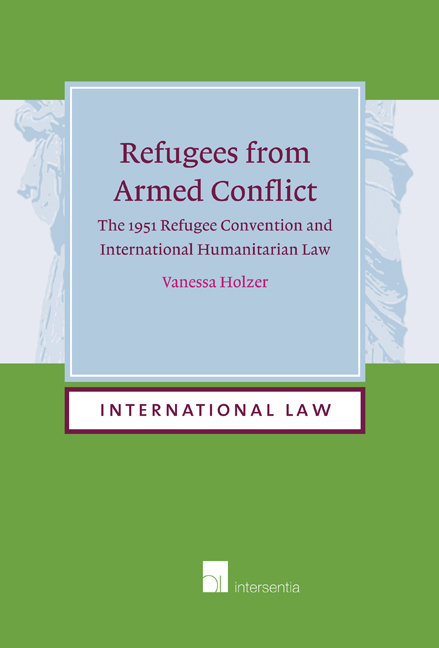Book contents
- Frontmatter
- Dedication
- Acknowledgements
- Contents
- Abbreviations
- Chapter 1 Introduction
- Chapter 2 The Historical Evolution of International Refugee Law in Light of Armed Conflict
- Chapter 3 The International Legal Framework for the Protection of the Individual in Armed Conflict
- Chapter 4 The Interpretation of the Refugee Definition
- Chapter 5 The Well-Founded Fear of Being Persecuted
- Chapter 6 Lack of Protection in the Country of Origin
- Chapter 7 The Nexus to a Refugee Convention Ground in Armed Conflict
- Chapter 8 Conclusion
- Bibliography
Chapter 4 - The Interpretation of the Refugee Definition
Published online by Cambridge University Press: 12 December 2017
- Frontmatter
- Dedication
- Acknowledgements
- Contents
- Abbreviations
- Chapter 1 Introduction
- Chapter 2 The Historical Evolution of International Refugee Law in Light of Armed Conflict
- Chapter 3 The International Legal Framework for the Protection of the Individual in Armed Conflict
- Chapter 4 The Interpretation of the Refugee Definition
- Chapter 5 The Well-Founded Fear of Being Persecuted
- Chapter 6 Lack of Protection in the Country of Origin
- Chapter 7 The Nexus to a Refugee Convention Ground in Armed Conflict
- Chapter 8 Conclusion
- Bibliography
Summary
INTRODUCTION
This chapter addresses the interpretation of the refugee definition in Article 1A(2) Refugee Convention with respect to refugee protection claims of individuals forced to flee from their country of origin due to armed conflict.
ARMED CONFLICT AND REFUGEE STATUS DETERMINATION
Since IHL and international criminal law are specifically designed for armed conflict as opposed to situations of peace, they can only inform the interpretation of the refugee definition if an armed conflict in the country of origin existed, exists or is likely to arise and if the refugee protection claim is related to the armed conflict. The refugee definition cannot solely be interpreted in light of these bodies of international law in order to ensure that claims related to situations of violence which do not constitute armed conflicts are addressed. However, in order to determine whether these branches of international law can complement and strengthen the interpretation of Article 1A(2) Refugee Convention, decision-makers ought to determine whether the situation in the country of origin was, is or is likely to constitute an armed conflict.
In a number of instances, national refugee status decision-makers and UNHCR considered the fact that there is or was an armed conflict in the country of origin relevant for the interpretation and application of the refugee definition. For example, courts in the UK and New Zealand considered the situation in Somalia a “civil war”. Guidelines adopted by the Refugee and Immigration Board of Canada apply specifically to refugee claimants from “situations of civil war”. The US Board of Immigration Appeals stated that Sri Lanka was experiencing “civil unrest in the form of an armed conflict”. The Federal Court of Canada found that Sierra Leone was in “a tragic situation of war or armed conflict”. In its Eligibility Guidelines, UNHCR considered the situations in Sri Lanka, Afghanistan, Colombia, Iraq, and Somalia as armed conflicts at different points in time. Yet national decision-makers and UNHCR do not necessarily intend to classify a situation as an armed conflict in the sense of IHL and may well base their assessments on varying definitions of armed conflict.
- Type
- Chapter
- Information
- Refugees from Armed ConflictThe 1951 Refugee Convention and International Humanitarian Law, pp. 83 - 104Publisher: IntersentiaPrint publication year: 2015



